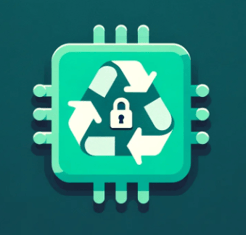Blog
Reuse Over Destruction
Why Developing Countries Benefit More from Wiping Than Shredding Hard Drives




In today’s hyper-digital world, data security and environmental responsibility often appear to be in conflict. For years, the dominant narrative in the corporate world has been: shred old hard drives to protect data. But this blanket approach ignores a significant opportunity—especially for developing countries.
Instead of defaulting to physical destruction, there's a more sustainable, socially impactful, and cost-effective alternative: securely wiping data and reusing old equipment.
Here’s why it makes more sense.
1. Shredding Is Wasteful—And Often Unnecessary
Shredding hard drives physically destroys valuable hardware. While it does ensure data is irretrievable, it also turns reusable equipment into landfill fodder. Most hard drives, especially from corporate environments, have years of life left. When securely wiped using industry-grade software (like DBAN, Blancco, or nwipe), the drives are just as safe for reuse as brand new ones—for a fraction of the cost.
2. Developing Countries Face a Technology Gap
Many schools, NGOs, startups, and even hospitals in developing countries operate on minimal budgets. The cost of new computing infrastructure is prohibitive. Reusing securely wiped hardware—especially desktops, laptops, and servers—can be a game-changer. It empowers communities, creates access to digital education, supports small business growth, and bridges the digital divide.
3. Recycling Reduces E-Waste and Carbon Footprint
E-waste is one of the fastest-growing waste streams in the world. Developing countries are disproportionately affected by it, often becoming dumping grounds for broken or unusable electronics. Instead of contributing to the problem, repurposing equipment through certified refurbishment programs keeps devices in use longer and dramatically reduces carbon emissions associated with manufacturing new hardware.
4. It Creates Local Jobs and Skills
When hardware is donated, shipped, and refurbished locally, it creates jobs in refurbishing, tech support, logistics, and training. It also encourages the development of technical skills, offering young people opportunities in IT and engineering. This is particularly valuable in regions where unemployment is high and access to technical education is limited.
5. Data Wiping Is Secure When Done Right
One of the biggest arguments for shredding is fear of data breaches. But this fear is largely outdated. Certified data destruction software used by professionals can securely overwrite all sectors of a hard drive, rendering the data unrecoverable even by advanced forensic tools. Organizations like the U.S. Department of Defense and NIST have published wiping standards that, when followed, provide confidence equal to physical destruction.
6. Reputation and ESG Benefits
For companies and governments in developed nations, donating wiped and reusable equipment aligns with ESG (Environmental, Social, and Governance) goals. It enhances brand image, reduces e-waste management costs, and fulfills Corporate Social Responsibility (CSR) mandates in a measurable, impactful way.
Final Thoughts
We live in a world where millions are still disconnected, while millions of devices are being destroyed out of precaution. It's time for a paradigm shift.
Reusing wiped hardware is not just secure—it’s ethical, economical, and environmentally essential. Instead of shredding, let’s redirect old tech to where it can do the most good.
Let’s turn data destruction into digital empowerment.
